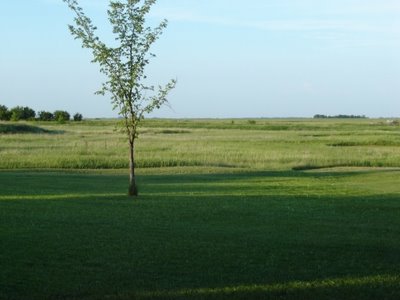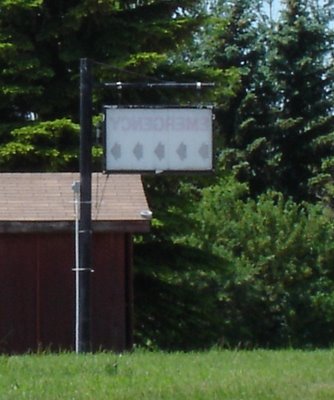Kate has
quoted Tom Harris's
critique of Al Gore's movie (An Incovenient Truth). Not having seen the movie, I can't say whether this critique presents Gore's arguments fairly, but I'm not concerned about defending Gore. I'm concerned about defending climate change science from the skeptical bias that builds up when people read only the critiques - only the articles that point out various apparent problems with climate change science - and not the science itself.
"Defending climate change science" sounds too grand and dramatic. I don't mean it that way. I have no delusions about saving the world, but I do have a sense of responsibility to speak up when the discussion comes around to me, and to stand up for the priorities that I have come to believe in after much thought and consideration of the range of arguments.
I say "the range of arguments" because I don't like to think of this topic in terms of two sides. Harris presents it as a choice between extremes: ". . . either the end of civilization, if you believe Gore, or a waste of billions of dollars, if you believe his opponents . . ." Statements like this create the illusion that there are two and only two theories about the planet's future, each one clearly defined, and each one totally incompatible with the other. This illusion can harden into a belief that there are actually two well-defined models of the planet's future, both models strongly supported by a body of science, but one model containing some fatal flaw and the other (quite naturally) being true.
If you come to this topic in search of evidence to help you choose a side, you may find exactly what you are looking for: a lot of information that seems to pull strongly one way. You may also find a lot that seems to pull strongly the other way. You may get frustrated, or cynical; you may simply choose whichever side makes you feel better; or you may just go back to what you believed in the first place.
There is another alternative.
Instead of looking at each piece of information as evidence to be assigned to a side, try looking at it as a jigsaw puzzle piece to be fitted into a picture of a landscape.
Your picture. Your map, with paths for you to choose (or forge alone) across it.
Take the pieces of information that Harris mentions in his "small sample of the side of the debate we almost never hear." These are not nuggets held by one side and unknown to the other. They are pieces of information seen differently by different people. One by one, then, let's have a look.
Harris quotes Tim Patterson saying that "when CO2 levels were over ten times higher than they are now, about 450 million years ago, the planet was in the depths of the absolute coldest period in the last half billion years."
This piece of information is new to me. I will keep an eye out for direct comments on it from people who know more than I do. However, I did try a Google search of "450 million years ago" together with "CO2," and the
first result was intriguing. This date is given as the approximate time when the ozone layer had developed enough to allow the beginning of terrestrial life. Clearly, we are talking about a time when the influences on Earth's climate were vastly different than they are today. Why should I assume that CO2 would have played the same role at that time as in more recent climate cycles which included feedbacks with terrestrial plant cover? If it didn't play the same role, then why should it show the same relationship with temperature? Just because there wasn't a relationship under those circumstances doesn't mean there can't be a relationship under current circumstances.
While looking for a place to fit this first piece into my jigsaw puzzle, I read an
article at Spencer Weart's website on the
Discovery of Global Warming, which gives a historical overview of the development of climate change science. I happened upon some information that addresses Harris's next point. Harris mentions Patterson's further testimony that "on all time scales, there is very good correlation between Earth's temperature and natural celestial phenomena such changes in the brightness of the Sun." Weart's article discussed these same correlations, which involve tiny cyclical changes in solar radiation reaching the Earth. I was surprised to discover that much of early climate change science had focussed on a perceived problem with these correlations. How could these tiny changes be translated into large changes in climate? When scientists hit on the idea of CO2 acting as a greenhouse gas, amplifying small changes in climate due to solar radiation, it was the missing piece they were searching for. It made Patterson's preferred explanation plausible. Isn't that interesting? We are not looking at competing theories at all, but rather at complementary explanations of the workings of different parts of a single system.
Next, Harris explains how "Dr. Boris Winterhalter . . . takes apart Gore's dramatic display of Antarctic glaciers collapsing into the sea." Was Gore trying to pass off footage of a natural, millenia-old process as evidence of global warming? I don't know. Whether he was or not, his tactics are not the topic of discussion here. The fact that glaciers have been calving icebergs for millenia is not news to global warming theorists, and it doesn't present a challenge to their theories.
Staying on the topic of glaciers in Antarctica, Harris refers to Dr. Wibjörn Karlén's assertion that "the 'mass balance' of Antarctica is positive - more snow is accumulating than melting off." An extremely detailed
recent feature in Physics World gives a much more uncertain picture of the mass balance, with different techniques of measurement giving results that range from positive to negative. The uncertainty discussed in this article is in sharp contrast to the figure given in Harris's article, which, although qualified with the word "possibly," nevertheless gives the reader the impression that mass balance is well understood.
In his next point, Harris alludes to this uncertainty. He calls Gore's assertion about "a precipitous drop-off in the amount and extent and thickness of the Arctic ice cap," "misleading." I would have to agree. Harris then quotes Tim Ball, discussing a difference in methodology between two surveys of Antarctic ice. Without more context, it is impossible to use this little bit of commentary as evidence for or against global warming theories. It may be evidence against getting your science from Al Gore. So?
Harris moves on to a discussion of temperature changes in the Arctic. He cites Karlén citing another scientist, Igor Polyakov, to argue that there is "no overall temperature rise" threatening polar bears in the Arctic. I read
the article by Polyakov and got a very different impression. Polyakov wasn't questioning whether there was warming. He was questioning whether there was "polar amplification of global warming." In the scattered and incomplete temperature records available for the Arctic, he did not find evidence that the Arctic is warming
more than the rest of the planet. One thing he did find, though, was "a general warming tendency over the entire record."
Harris also quotes Dr. Dick Morgan discussing ice thickness in the Canadian Arctic. Notice that, while Morgan says there is "no melt down," he still acknowledges "some decrease in ice thickness." If you're still trying to take sides, where will you slot this piece of information?
Harris gives another quote from Morgan, claiming that the IPCC's use of the Mercator projection to calculate global average temperature "doubled the area of warming in Alaska, Siberia and the Antarctic Ocean." I haven't heard this argument before, and I find it very hard to believe that in all the fine tuning of temperature calculations to compensate for things like urban heat-island effects, scientists would unanimously overlook something so simple as this. I spent some considerable time combing through Google search results for more information, but got tired of finding only repetitions of Morgan's claim and no discussions of its validity. I'll keep my eyes open.
UPDATE: Like I thought:
of course the global average temperature calculation allows for differences in area between grid squares at higher versus lower latitudes. From the
FAQ's regarding temperature datasets available from the Climatic Research Unit, University of East Anglia, Norwich, UK:
Why do global and hemispheric temperature anomalies differ from those quoted in the IPCC assessment and the media?
We have areally averaged grid-box temperature anomalies (using the HadCRUT2v dataset), with weighting according to the area of each 5° x 5° grid box, into hemispheric values; we then averaged these two values to create the global-average anomaly. However, the global and hemispheric anomalies used by IPCC and in the World Meteorological Organization and Met Office news releases were calculated using optimal averaging. This technique uses information on how temperatures at each location co-vary, to weight the data to take best account of areas where there are no observations at a given time. The method uses the same basic information (i.e. in future HadCRUT2v and subsequent improvements), along with the data-coverage and the measurement and sampling errors, to estimate uncertainties on the global and hemispheric average anomalies. The more elementary technique (used here) produces no estimates of uncertainties, but our results generally lie within the ranges estimated by optimum averaging.
Emphasis mine. Note that although the IPCC technique is different, it uses the
same basic information, and gives results similar to those of this "more elementary technique." [End of update.]
Finally, Harris says that Gore made a misleading point, "that 200 cities and towns in the American West set all time high temperature records." I don't know if Gore gave any context for that point; if he did not, I'll agree that it is misleading. If he was using it as an example of things to come, I might give him some latitude, but generally, discussions of local or regional high temperature records are a distraction. There will always be regional fluctuations. More convincing evidence for global warming is in the fact that overall average temperatures show warming, in spite of these fluctuations.
According to Harris, Gore is predicting "the end of civilization" on the basis of "junk science." Maybe so. But the existence of a bad argument for an extreme scenario does not in any way weaken the good arguments for reasonable - and still serious - scenarios of global warming.
It doesn't weaken the arguments, but it can certainly weaken their influence. Just look at all the
bloggers linking and quoting Harris's piece.
Harris says:
We should listen most to scientists who use real data to try to understand what nature is actually telling us about the causes and extent of global climate change.
I could not agree more.












